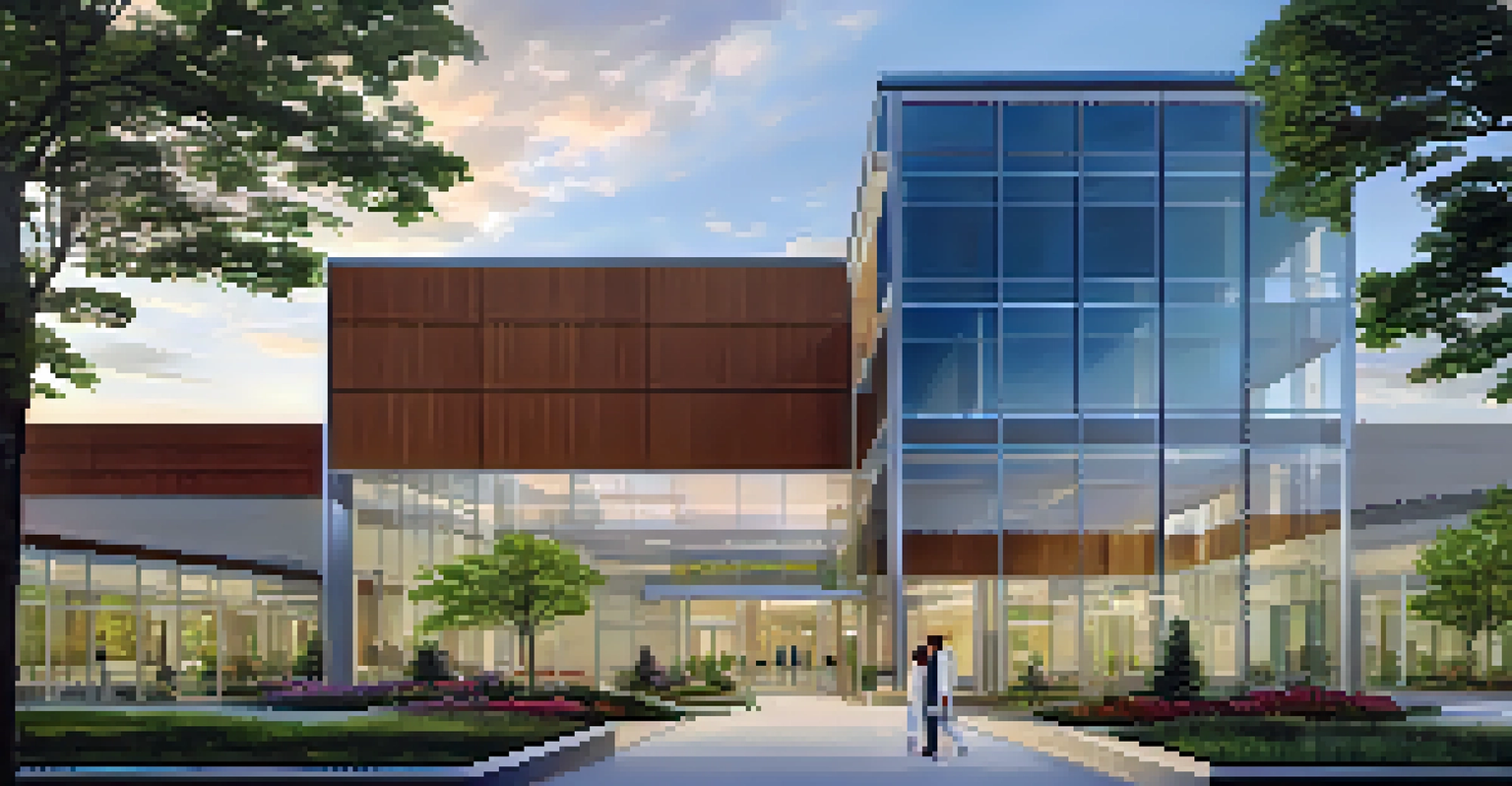Healthcare Industry's Impact on Buffalo's Economic Landscape

The Growth of Healthcare Jobs in Buffalo
Buffalo's healthcare sector has seen impressive growth over the last decade, creating thousands of jobs. Major hospitals and healthcare institutions have expanded their facilities and services, leading to an influx of employment opportunities. This growth isn't just limited to medical professionals; ancillary roles in administration, IT, and support services have also surged.
Healthcare is not just about treating illnesses; it’s about creating a healthier community.
A vibrant job market not only helps individuals find stable employment but also contributes to the overall economic health of the region. As people move to Buffalo for these jobs, they bring spending power that benefits local businesses, from coffee shops to real estate. This ripple effect illustrates how healthcare can be a cornerstone of economic vitality.
Moreover, the diversification of job types within the healthcare sector means that a broader range of skills are in demand. This evolution supports educational institutions in Buffalo, which are adapting their programs to meet these new needs, fostering a skilled workforce for the future.
Investment in Healthcare Infrastructure
Buffalo's healthcare industry is not only about jobs; it also involves significant investment in infrastructure. New hospitals, clinics, and research facilities are being built, which enhances the city’s appeal for both residents and businesses. These investments signal a commitment to providing high-quality care and improving health outcomes for the community.

Infrastructure projects often create temporary jobs during construction, which adds another layer to the economic impact. Once these facilities are operational, they require ongoing staff, thus ensuring long-term employment opportunities. This cycle of investment and job creation strengthens Buffalo's position as a healthcare hub.
Healthcare Jobs Drive Economic Growth
The expansion of Buffalo's healthcare sector has generated thousands of jobs, positively impacting the local economy.
Additionally, improved healthcare facilities can attract patients from surrounding areas, boosting the local economy. This influx of patients means more business for local hotels, restaurants, and shops, further integrating the healthcare sector into the broader economic landscape.
Innovation and Research in Buffalo's Healthcare Sector
Innovation is at the heart of Buffalo's healthcare industry, with several research institutions leading the way. These organizations not only contribute to advancements in medical technology and patient care but also attract significant funding and partnerships. This influx of resources fuels further research and development, creating a dynamic environment for innovation.
The greatest wealth is health.
As new treatments and technologies are developed, they can lead to new business opportunities and startups in the area. Entrepreneurs are drawn to Buffalo's thriving healthcare ecosystem, fostering a culture of collaboration between academia, industry, and healthcare providers. This synergy can lead to groundbreaking advancements that put Buffalo on the map as a leader in healthcare innovation.
Moreover, the focus on research creates educational opportunities for students interested in pursuing careers in science and medicine. As these students graduate and enter the workforce, they contribute to the local economy, ensuring a continuous cycle of talent and innovation.
Healthcare's Role in Community Well-Being
The healthcare industry in Buffalo plays a crucial role in the overall well-being of the community. Access to quality healthcare services directly influences public health outcomes, which in turn affects economic productivity. A healthier population is more likely to be active in the workforce, reducing absenteeism and boosting local businesses.
Furthermore, healthcare providers often engage in community outreach programs that address health disparities. By focusing on preventive care and education, these initiatives help improve health literacy and empower residents to take charge of their health. This proactive approach not only enhances individual well-being but also fosters a stronger, more resilient community.
Investment Boosts Healthcare Infrastructure
Significant investments in new healthcare facilities enhance Buffalo's appeal and create long-term employment opportunities.
Additionally, when healthcare providers collaborate with local organizations, it creates a network of support that benefits everyone. From mental health services to nutrition programs, these partnerships help address a variety of health needs, showcasing the profound impact of healthcare on community vitality.
Economic Resilience Through Healthcare
The healthcare industry is often viewed as a stabilizing force during economic downturns. Unlike other sectors that may experience volatility, healthcare demand remains relatively constant, as people will always need medical attention. This stability can help buffer Buffalo’s economy against broader economic challenges, making it an essential pillar for resilience.
During times of economic uncertainty, healthcare jobs tend to be less affected, providing job security for many residents. This sense of stability encourages consumer confidence, as individuals are more likely to spend when they feel secure in their employment. Thus, the healthcare sector not only supports employment but also contributes to overall economic confidence in Buffalo.
Moreover, the presence of a robust healthcare system can attract new businesses looking for a reliable workforce. Companies often consider the health and wellness of potential employees, and strong healthcare services can be a significant factor in their decision to invest in Buffalo.
The Interconnectedness of Healthcare and Local Businesses
The healthcare sector in Buffalo doesn’t operate in a vacuum; it has strong ties to local businesses and industries. From pharmaceutical companies to supply chain management, many businesses rely on the healthcare sector's growth. This interconnectedness creates a supportive ecosystem where each entity contributes to the overall economic health of Buffalo.
For instance, local restaurants and cafes benefit from the influx of healthcare professionals and patients visiting the area. When hospitals and clinics expand, they often lead to increased foot traffic that local businesses can capitalize on, creating a symbiotic relationship that fuels economic growth.
Healthcare Innovation Fuels Local Economy
The focus on research and innovation in Buffalo's healthcare sector is attracting entrepreneurs and fostering economic development.
Additionally, partnerships between healthcare providers and local businesses can lead to innovative programs and services. By working together, they can create wellness initiatives that benefit employees and the community, further enhancing the local economy and quality of life.
Future Outlook: Healthcare's Continued Economic Influence
Looking ahead, the healthcare industry is poised to continue playing a vital role in Buffalo's economic landscape. With ongoing advancements in technology and an emphasis on personalized care, the sector is evolving rapidly. This evolution will likely lead to new job opportunities and economic contributions that go beyond traditional healthcare roles.
As Buffalo embraces telehealth and digital health solutions, the potential for remote jobs and tech-related positions will increase. This shift not only modernizes healthcare delivery but also diversifies the local economy, attracting tech-savvy individuals to the area. The blend of healthcare and technology could redefine the job market in Buffalo.

Moreover, as the population ages, the demand for healthcare services will only grow. This demographic shift presents both challenges and opportunities for Buffalo, as the city must adapt its healthcare offerings to meet the needs of its residents. By investing in this sector now, Buffalo can ensure a robust economic future.